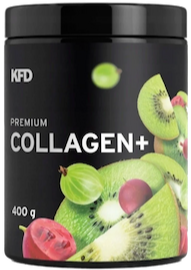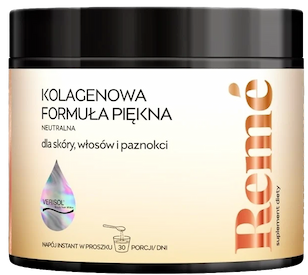Grandma's ways for joints vs. scientific research: does it work?
We take a look at grandma's joint remedies. See if home methods work.


Learn more about our editorial process
.

Learn more about our editorial process
.

Learn more about our editorial process
.

Learn more about our editorial process
.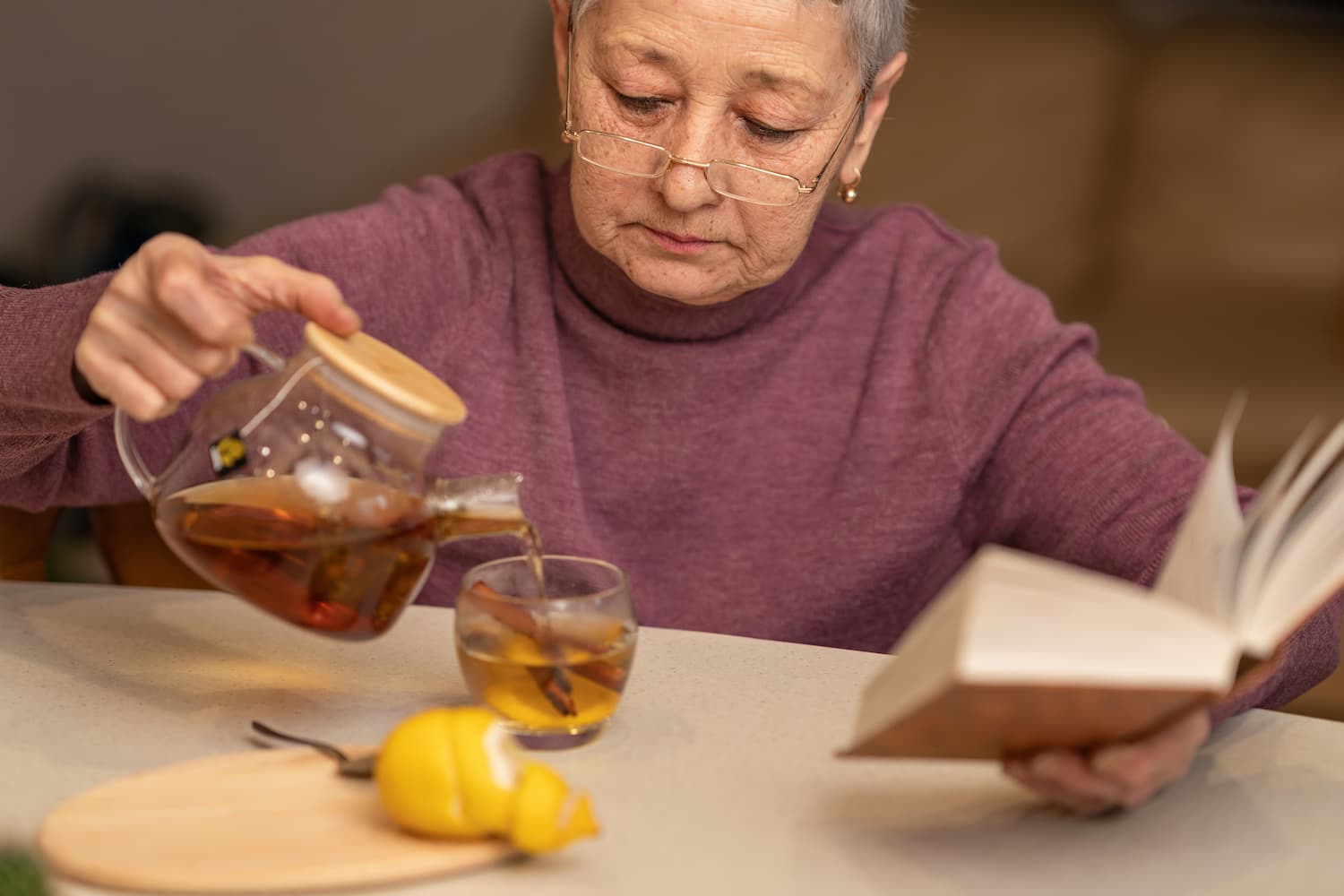
Why you can trust us
Articles on Natu.Care are written based on scientific research, data from government websites and other reliable sources. The texts are written in cooperation with doctors, nutritionists and other health and beauty experts. Articles are reviewed before publication and during significant updates.
.Learn more about our editorial process
.Information about advertisements
Content on Natu.Care may contain links to products from the sale of which we may receive a commission. When creating content, we adhere to high editorial standards and take care to be objective about the products discussed. The presence of affiliate links is not dictated by our partners, and we select the products we review ourselves completely independently.
.Learn more about our terms and Conditions
.Contrary to appearances, joint pain does not only affect seniors - it can happen to any of us, regardless of age. However, it is grandmothers who are the masters of home remedies for everything. Does their advice make sense?
To find out, I invite you into the ring. In one corner, the noble senior of the family, connoisseur of life, champion of Amole treatment and author of the best dumplings in the world: grandmother. In the second, masters of samples, vials and analysis; specialists in hard-to-pronounce words; and tasters of statistical data: scientists. Let's get ready to rumble!
From this article you will learn:
.- Do grandma's remedies for aching joints have science to back them up: .
- Whether you can effectively treat joint pain with home remedies.
- What are the best ways to treat joint pain?
- Which ones really work. .
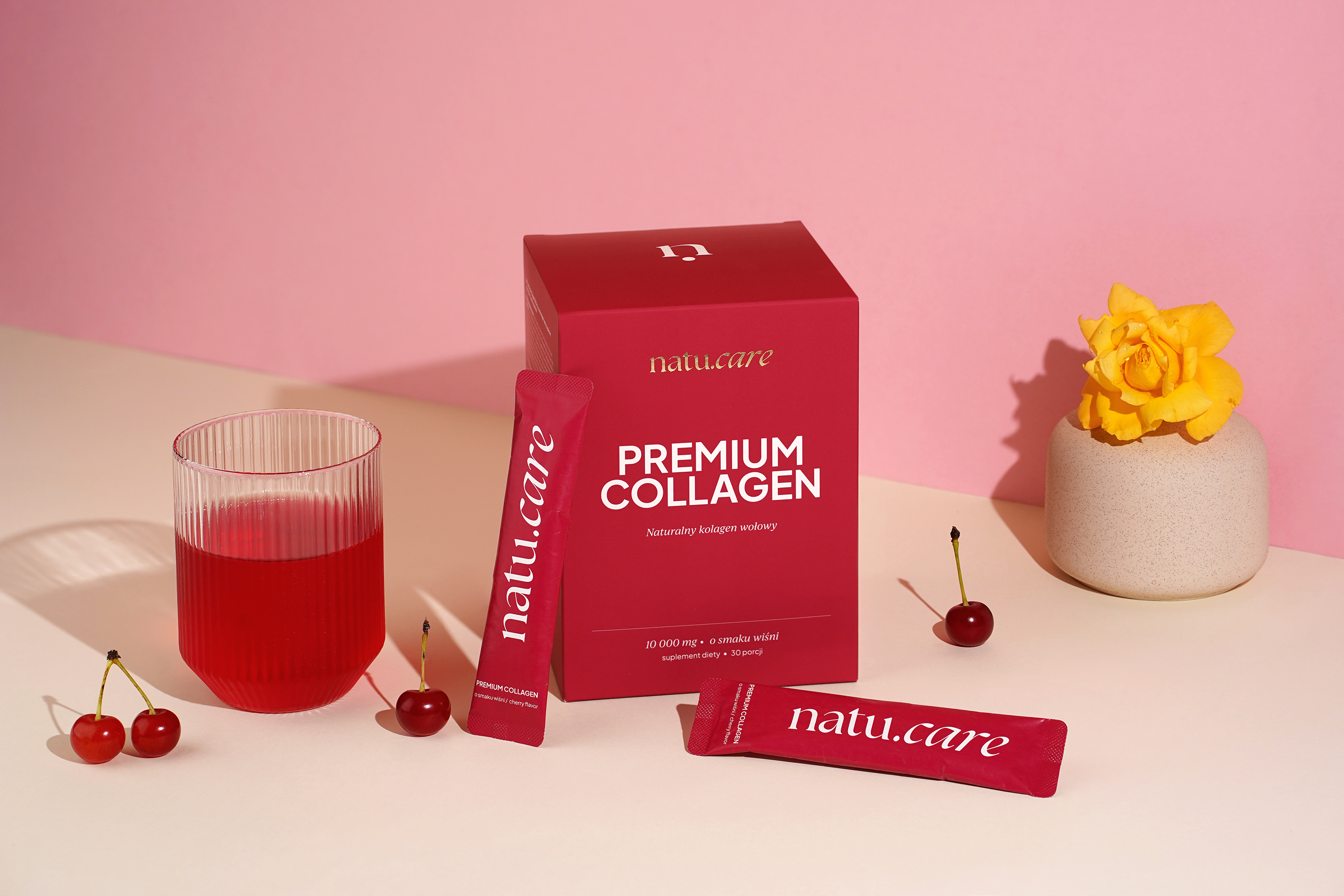
Sprawdź, jak może on zadbać o zdrowie Twoich stawów i urodę! Kolagen Premium (10 000 mg) wiśnia
Natu.Care Kolagen Premium Sport 10000 mg, wiśnia
Natu.Care Kolagen Premium dla zdrowia stawów, skóry, paznokci i włosów. Wołowy kolagen w optymalnej dawce 10 000 mg. Przebadany przez niezależne laboratorium.
Sprawdź cenę
Ten kolagen dobrze się rozpuszcza, super smakuje – jak taki soczek wiśniowy. Moje włosy przestały wypadać, są gęstsze i zdrowsze a cera promienna.@Dominika P.
See also:
.
- Home remedies for knee pain .
- Ways to get crunchy knees
- Best collagen for joints
- Best collagen for bones
- Best collagen for runners
- Best collagen for athletes
- The most powerful collagen
- Collagen for horses for humans: doctor's opinion
- Tennis elbow
- Golfer's elbow
- Gonarthrosis
- Rheumatoid arthritis
- How to take care of your health
- What is creatine
A word of introduction...
.
Before we get into an absolute skirmish in which we take the most popular grandma's ways for joints under the microscope, it should be made clear:
Do not treat yourself on your own. Even the best home remedies are no substitute for medical advice. Similar symptoms in your neighbour does not mean that you are suffering from the same ailment. And just because a remedy, preparation or method has worked for one person, does not guarantee that it will work for you. In fact, they may even harm you.
If your joints ache, feel stiff, experience swelling - go to the doctor. Only he/she will be able to make the right diagnosis and choose the optimal treatment. Treat this article with a pinch of salt and the advice given here as a possible complementary therapy.
Grandmother's remedies for joints include warm and cold compresses, cabbage poultices, sulphur baths or rubbing vinegar into painful areas. Grandmothers also advocate eating turmeric and garlic. All of this is said to support the health of our musculoskeletal system and support the fight against joint pain.
Let's find out if it works.
Grandma's advice: warm up or cool down
.
How to use: Apply a cold or warm compress to the painful area. Alternatively, warm the area by wrapping it with a blanket or scarf.
What's the science on this: This home remedy is a surefire way to help. Just remember that if the pain is a consequence of inflammation, the joint needs to be cooled. If, on the other hand, it is related to increased muscle tension, the area needs to be warmed.
Inflammation causes an increase in temperature. With viral illnesses, the whole body has a fever, but when inflammation affects the knee, for example, the temperature of the tissues in that very joint will be raised. Yes, you could say that your knee gets a fever.
.
Cooling the painful area where the inflammation develops calms its symptoms - it reduces the fever. It also blocks the secretion of substances that sustain inflammation and reduces the accompanying swelling. In addition, cold reduces the sensitivity of pain receptorsand.
For long-standing pains that are not inflammatory, you can try heating the painful area. The heat dilates the blood vessels and causes the muscles to relax. This relaxation of the muscular system will help relieve tension within the painful jointand.
Result: It works - a point for granny.
Do you know what else helps your joints? Collagen - its effects are also confirmed by researchand.
Natu.Care Collagen Premium 5000 mg, mango-maracuja

- Collagen content: 5000 mg marine collagen hydrolysate
- .
- Additional active ingredients: vitamin C, low molecular weight hyaluronic acid (and L-theanine and coenzyme Q10 in cocoa flavoured collagen or vitamin A and vitamin E in mango–passion fruit flavoured collagen)
- .
- Form: powder sachets
- .
- Dose: 1 sachet per day
- .
- Sufficient for: 30 days
- .
Product description
Fish collagen from the Natu.Care brand in a dose of 5000 mg. The formula contains a sufficient portion of the active substance to positively affect your joints, musculoskeletal system and immunity.
Take care of your tendons, joint cartilage, ligaments, muscles and even bones by supplying them with the building blocks to function properly. Move without bólu and provide the necessary support for any physical activity.
And as a „gratis” to regular supplementation, you will also receive firm skinóhand, healthy and shiny hair and strong nails.
Natu.Care Premium Collagen is available in two flavours – Cacao Bloom and Rise&Shine. Both formulas are based on the following active ingredients: marine collagen hydrolysate, wild roseóbud extract and hyaluronic acid.
Additionally, Cacao Bloom contains natural L-theanine, coenzyme Q10 and defatted Dutch cacao. Rise&Shine instead contains vitamin E and vitamin A.
These are the best collagens in the world.
These best fish collagens on the market also rós taste – Cacao Bloom is a treat for chocolate lovers. Rise&Shine will appeal to those whoóenjoy the refreshing taste of mangoófruit and passion fruit.
Pros and cons
Fish collagen from the Natu.Care brand in a dose of 5000 mg. The formula contains a sufficient portion of the active substance to positively affect your joints, musculoskeletal system and immunity.
Take care of your tendons, joint cartilage, ligaments, muscles and even bones by supplying them with the building blocks to function properly. Move without bólu and provide the necessary support for any physical activity.
And as a „gratis” to regular supplementation, you will also receive firm skinóhand, healthy and shiny hair and strong nails.
Natu.Care Premium Collagen is available in two flavours – Cacao Bloom and Rise&Shine. Both formulas are based on the following active ingredients: marine collagen hydrolysate, wild roseóbud extract and hyaluronic acid.
Additionally, Cacao Bloom contains natural L-theanine, coenzyme Q10 and defatted Dutch cacao. Rise&Shine instead contains vitamin E and vitamin A.
These are the best collagens in the world.
These best fish collagens on the market also rós taste – Cacao Bloom is a treat for chocolate lovers. Rise&Shine will appeal to those whoóenjoy the refreshing taste of mangoófruit and passion fruit.
Additional information
Fish collagen from the Natu.Care brand in a dose of 5000 mg. The formula contains a sufficient portion of the active substance to positively affect your joints, musculoskeletal system and immunity.
Take care of your tendons, joint cartilage, ligaments, muscles and even bones by supplying them with the building blocks to function properly. Move without bólu and provide the necessary support for any physical activity.
And as a „gratis” to regular supplementation, you will also receive firm skinóhand, healthy and shiny hair and strong nails.
Natu.Care Premium Collagen is available in two flavours – Cacao Bloom and Rise&Shine. Both formulas are based on the following active ingredients: marine collagen hydrolysate, wild roseóbud extract and hyaluronic acid.
Additionally, Cacao Bloom contains natural L-theanine, coenzyme Q10 and defatted Dutch cacao. Rise&Shine instead contains vitamin E and vitamin A.
These are the best collagens in the world.
These best fish collagens on the market also rós taste – Cacao Bloom is a treat for chocolate lovers. Rise&Shine will appeal to those whoóenjoy the refreshing taste of mangoófruit and passion fruit.
User review
Fish collagen from the Natu.Care brand in a dose of 5000 mg. The formula contains a sufficient portion of the active substance to positively affect your joints, musculoskeletal system and immunity.
Take care of your tendons, joint cartilage, ligaments, muscles and even bones by supplying them with the building blocks to function properly. Move without bólu and provide the necessary support for any physical activity.
And as a „gratis” to regular supplementation, you will also receive firm skinóhand, healthy and shiny hair and strong nails.
Natu.Care Premium Collagen is available in two flavours – Cacao Bloom and Rise&Shine. Both formulas are based on the following active ingredients: marine collagen hydrolysate, wild roseóbud extract and hyaluronic acid.
Additionally, Cacao Bloom contains natural L-theanine, coenzyme Q10 and defatted Dutch cacao. Rise&Shine instead contains vitamin E and vitamin A.
These are the best collagens in the world.
These best fish collagens on the market also rós taste – Cacao Bloom is a treat for chocolate lovers. Rise&Shine will appeal to those whoóenjoy the refreshing taste of mangoófruit and passion fruit.
Natu.Care Collagen Premium 10000 mg, cherry

- Collagen content: 10,000 mg of hydrolyzed bovine collagen
- Additional active ingredients: vitamin C, low molecular weight hyaluronic acid, glucosamine, chondroitin, extract of Indian frankincense resin (boswellia serrata)
- Form: powder sachets for drinking
- Serving: 1 sachet per day
- Lasts for: 30 days
Product description
One of the strongest collagens on the market, providing as much as 10,000 mg per daily serving. This product can effectively support the condition of joints, skin, hair, and nails.
With this supplement, you will support your skeletal and joint system as well as your beauty, helping you visually halt the aging process and feel rejuvenated!
Pros and cons
Pros:
- The daily portion of collagen is very large – as much as 10,000 mg.
- Proven collagen formula – COLLinstant, whose effectiveness has been confirmed in clinical studies.
- Effective dose of hyaluronic acid, which additionally moisturizes the skin and positively affects joint health.
- Vitamin C supports the body's natural collagen production.
- Glucosamine is a fundamental building block of compounds found in joint cartilage and a component of collagen that gives elasticity to connective tissue in tendons.
- Chondroitin is a natural component found in the human body, mainly in cartilage. This large molecule (mucopolysaccharide) has the ability to absorb water, which helps maintain the elasticity and resilience of cartilage.
- Frankincense resin extract supports blood circulation and joint mobility and reduces their stiffness. It may help alleviate inflammatory conditions.
- The composition has been tested by the independent and accredited J.S. Hamilton laboratory.
Cons:
- None.
Additional information
Users praise Natu.Care Collagen Premium for the easy dissolving of the powder.
ALLDEYNN Collarose Fish
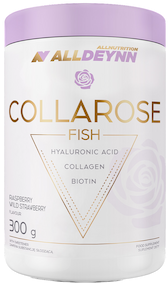
- Collagen content: 5000 mg hydrolysate fish collagen VERISOL F® .
- Additional active ingredients: vitamin C, hyaluronic acid, biotin
- Form: powder to dissolve in water .
- Dose: one scoop (6 g) of powder daily .
- Sufficient for: 50 days .
Product description
Atlantic cod collagen VERISOL F® contained in the formula are easily absorbed collagen peptides of fish origin. Regular supplementation can firm your skinóhand and slow down the ageing process. Your nails will become stronger and stop breaking. The addition of biotin will improve the condition of your hairów. The collagen portion is high enough to also have a good effect on your joints, muscles and bones.
Pros and cons
Atlantic cod collagen VERISOL F® contained in the formula are easily absorbed collagen peptides of fish origin. Regular supplementation can firm your skinóhand and slow down the ageing process. Your nails will become stronger and stop breaking. The addition of biotin will improve the condition of your hairów. The collagen portion is high enough to also have a good effect on your joints, muscles and bones.
Additional information
Atlantic cod collagen VERISOL F® contained in the formula are easily absorbed collagen peptides of fish origin. Regular supplementation can firm your skinóhand and slow down the ageing process. Your nails will become stronger and stop breaking. The addition of biotin will improve the condition of your hairów. The collagen portion is high enough to also have a good effect on your joints, muscles and bones.
Expert and user opinion
Atlantic cod collagen VERISOL F® contained in the formula are easily absorbed collagen peptides of fish origin. Regular supplementation can firm your skinóhand and slow down the ageing process. Your nails will become stronger and stop breaking. The addition of biotin will improve the condition of your hairów. The collagen portion is high enough to also have a good effect on your joints, muscles and bones.
DuoLife Collagen fish collagen 2500 mg
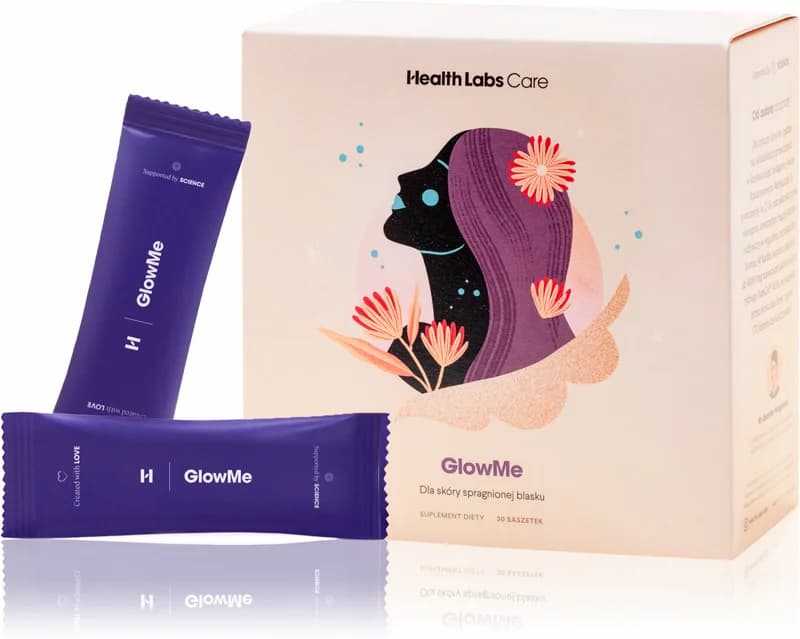
- Collagen content: 2500 mg collagen
- Additional active ingredients: vitamin C, silicon, glucosamine, hyaluronic acid, nettle and bamboo extracts
- Form: liquid to drink .
- Dose:25 ml .
- Sufficient for: 30 days .
Product description
100% natural collagen liquid without unnecessary ingredientsós. The composition of ingredientsós improves the appearance and condition of skinóry, hairów, nails. DuoLife is a good choiceór if you notice the first signs of skinóry ageing or want to stop this process. A tasty liquid, convenient to use.
Pros and cons
100% natural collagen liquid without unnecessary ingredientsós. The composition of ingredientsós improves the appearance and condition of skinóry, hairów, nails. DuoLife is a good choiceór if you notice the first signs of skinóry ageing or want to stop this process. A tasty liquid, convenient to use.
Additional information
100% natural collagen liquid without unnecessary ingredientsós. The composition of ingredientsós improves the appearance and condition of skinóry, hairów, nails. DuoLife is a good choiceór if you notice the first signs of skinóry ageing or want to stop this process. A tasty liquid, convenient to use.
User review
100% natural collagen liquid without unnecessary ingredientsós. The composition of ingredientsós improves the appearance and condition of skinóry, hairów, nails. DuoLife is a good choiceór if you notice the first signs of skinóry ageing or want to stop this process. A tasty liquid, convenient to use.
Pharmovit liquid collagen 10000 mg
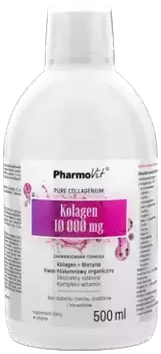
- Collagen content: 10000 mg hydrolysed bovine collagen types I and III .
- Additional active ingredients: hyaluronic acid, natural plant extracts, vitamin C, B vitamins, zinc, vitamin D
- Form: vials .
- Dose: 25 ml .
- Sufficient for: 20 days .
Product description
A solid daily dose of collagen for jointómuscle and bone health and beauty. The duo of collagen and vitamin C has a positive effect on each other, so that „the protein of youth” is better absorbed and more efficiently produced in the body.
Pros and cons
A solid daily dose of collagen for jointómuscle and bone health and beauty. The duo of collagen and vitamin C has a positive effect on each other, so that „the protein of youth” is better absorbed and more efficiently produced in the body.
Additional information
A solid daily dose of collagen for jointómuscle and bone health and beauty. The duo of collagen and vitamin C has a positive effect on each other, so that „the protein of youth” is better absorbed and more efficiently produced in the body.
KFD Premium Collagen+
Product description
High dose of collagen and a real bomb of vitamins C and D and organic sulphur. With this preparation the effects will come immediately. You will improve the firmness of your skin and reduce wrinkles. Your hair and nails will be strong and shiny.
A generous dose of collagen will improve the mobility of your jointsós, benefit your bone system and muscles. Do you do sports and need a product thatós able to keep up with your needs? This product will do the trick.
Pros and cons
High dose of collagen and a real bomb of vitamins C and D and organic sulphur. With this preparation the effects will come immediately. You will improve the firmness of your skin and reduce wrinkles. Your hair and nails will be strong and shiny.
A generous dose of collagen will improve the mobility of your jointsós, benefit your bone system and muscles. Do you do sports and need a product thatós able to keep up with your needs? This product will do the trick.
Additional information
High dose of collagen and a real bomb of vitamins C and D and organic sulphur. With this preparation the effects will come immediately. You will improve the firmness of your skin and reduce wrinkles. Your hair and nails will be strong and shiny.
A generous dose of collagen will improve the mobility of your jointsós, benefit your bone system and muscles. Do you do sports and need a product thatós able to keep up with your needs? This product will do the trick.
Expert opinion
High dose of collagen and a real bomb of vitamins C and D and organic sulphur. With this preparation the effects will come immediately. You will improve the firmness of your skin and reduce wrinkles. Your hair and nails will be strong and shiny.
A generous dose of collagen will improve the mobility of your jointsós, benefit your bone system and muscles. Do you do sports and need a product thatós able to keep up with your needs? This product will do the trick.
Product description
The dietary supplement from Remé contains beef collagen in a patented formula and vitamin C, whichóra aids its absorption. The formula comes in three flavours: neutral, orange-maracuja and strawberry-pomegranate. The formula can effectively support and improve the condition of the skinóry, hairóry and nails.
Pros and cons
The dietary supplement from Remé contains beef collagen in a patented formula and vitamin C, whichóra aids its absorption. The formula comes in three flavours: neutral, orange-maracuja and strawberry-pomegranate. The formula can effectively support and improve the condition of the skinóry, hairóry and nails.
Additional information
The dietary supplement from Remé contains beef collagen in a patented formula and vitamin C, whichóra aids its absorption. The formula comes in three flavours: neutral, orange-maracuja and strawberry-pomegranate. The formula can effectively support and improve the condition of the skinóry, hairóry and nails.
The dietary supplement from Remé contains beef collagen in a patented formula and vitamin C, whichóra aids its absorption. The formula comes in three flavours: neutral, orange-maracuja and strawberry-pomegranate. The formula can effectively support and improve the condition of the skinóry, hairóry and nails.
Grandmother's advice: apply cabbage
.
How to use: A fresh cabbage leaf needs to be maltreated a little (you can smash it with a meat pestle) so that it starts to release its juice. Then simply apply it to the painful area and wrap it in a bandage. Such a poultice is recommended by grandmothers to be worn for several hours.
.
Cabbage leaf compresses are said to help with joint pains, including those associated with arthritis and rheumatism. In addition, grandmothers claim that they also help with swelling, mastitis and even varicose veins.
They also help with swelling, breast inflammation and even varicose veins.
What science says about it: Cabbage is perhaps the most underrated super food in Poland. It is full of vitamins and minerals. In addition, the isothiocyanates it contains have anti-cancer, antioxidant and anti-inflammatory properties.
However, are these compounds likely to work through the skin, and does a cabbage leaf have enough of them to improve the condition of a painful joint?"
.
The 2022 study tested the efficacy of three treatments for osteoarthritis pain. Patients were divided into groups with cabbage leaf compresses, cooling gels and ointments with diclofenac (an anti-inflammatory and analgesic drug), respectively.
The study also found that the patients were not given enough to improve their arthritis pain.
We found that cabbage leaf compresses had similar therapeutic efficacy to cooling gels, and both methods gave participants more relief than rubbing in diclofenacand.
.
Another study (also from 2022) examined the anti-inflammatory properties of miRNA, which occurs naturally in cabbage. This is a specific type of ribonucleic acid (RNA), responsible for the expression of other genes.
The miRNA molecules were isolated from the vegetable cabbage, but the typical leaf wrappers were not used in the experiment.
In an in vitro study, in both human and mouse cells, the study showed a decrease in inflammatory factors in rheumatoid arthritis (RA). Also in in vivo trials in mice with RA, positive effects such as a reduction in swellingand.
The health-promoting effects of plants from the cabbage family are attributed to the sulphur-containing glucosinolates found in them..
 .
.
Katarzyna Grajpermagister of pharmacy
.Result: Ok, action confirmed - point for granny.
Grandma's advice: bathe in sulphur
.
How to use: If you have a sensitive nose, you won't like this method. The sulphur water stinks unpleasantly (the term 'doesn't smell the best' is inadequate). But if you are a die-hard, you can try immersing yourself in water with sulphur salt added.
This bath is supposed to have anti-inflammatory, analgesic and relaxing properties. The sulphur water should be around 38 ºC (i.e. warm, but not hot) and the bath should last 15-20 minutes.
What to do if you want to take a bath.
What the science says: Sulphur baths are therapeutic treatments that have been used in spas for a long time. This method is classified as balneotherapy, a type of physiotherapy that uses nature's treasures: mineral waters and spa gases for treatment.
There are many studies proving the effectiveness of balneotherapy in the treatment of joint diseases, especially those of a chronic nature. As for the effectiveness of sulphur baths - there is no shortage of these eitherand.
Research shows that bathing in sulphate water reduces pain, tension and joint swelling. Although the mechanism of action is not fully understood, these effects are attributed to increased sodium excretionand.
Without getting into the biochemistry, researchers agree - balneotherapy and sulphur baths improve joint function and overall performance, enhancing patients' quality of lifeand.
.
Result: Grandma advises well - point for her.
Grandmother's advice: you need to spread it
.
Suggestion: Have you got pain in your back? Does it make your knee creak? At least you know you're alive. Walk around, move around (maybe clean something?) it will pass you by. I doubt there will be anyone who hasn't heard it at least once.
.
What's the science on this: This advice could be golden. It can also be the nail in the coffin. It all depends on the cause of the pain. If you have a joint injury or the pain is related to inflammation, an extra dose of exercise can make your condition worse - especially in the early stages of treatment.
If, however, your joint pain is caused, for example, by sitting in one position for long periods of time (with your nose in your phone or slapping away at your computer keyboard), movement will be your salvation.
One other issue is the role of physiotherapy in the treatment of joint ailments. Appropriate exercise is key to recovery and improved quality of life for the majority of people struggling with joint pain, stiffness and reduced function.
The right exercise is the key to recovery and improved quality of life for the majority of people struggling with joint pain, stiffness and reduced functionality.
Physiotherapy treatments are standard medical proceduresand and citing research to support this is unlikely to be necessary.
Result: Movement for joint pain can help and harm equally well. It all depends on the circumstances. And because the most important thing is not to harm - this time I award the point to the scientists.
Important
With aching joints, it is best to see a doctor, who will determine the cause of the ailment and decide whether and at what stage of treatment to include appropriate physical activity.
Important
. .
Grandmother's advice: rub in vinegar
.
How to use: Rub apple cider vinegar into the sore area. Apparently this is a method recommended not only by grandmothers but also by... athletes. Unfortunately, I have not been able to find any statement from a well-known athlete on this subject.
What science says about it: The antiseptic properties of apple cider vinegar have been known for centuries. However, eliminating bacteria is nowhere near the treatment of joint ailments. What about the anti-inflammatory properties?
.
A 2017 study conducted on obese mice suggested that apple cider vinegar actually reduced rates of inflammatory processesand. The scuttlebutt? Firstly, the study involved mice, secondly it was about oral ingestion of vinegar, not rubbing it in, and thirdly it tested the properties of a particular type of vinegar - Nipa.
It is also worth mentioning that the Arthritis Foundation of America (dedicated to supporting people with arthritis) lists apple cider vinegar among 10 myths about what helps arthritis symptomsand.
.
Truly, I too have not been able to find research confirming the effectiveness of apple cider vinegar (especially in the form of a rub) for joint complaints.
Result: Sorry granny, not this time...
Grandma's advice: you're not eating enough
.
Suggestion: I know, that's what all grandmothers think, especially when you refuse another helping of bigos. But in this case, it's specifically about garlic and curcuma. Grandmothers recommend adding the 'aromatic' cloves to most dishes and, in the evening, drinking golden milk, a drink made with turmeric.
What's the science on this: First, garlic. It is called a natural antibiotic, thanks to its antibacterial properties. It is also a great antioxidant and has anti-inflammatory effectsand. It is worth mentioning that one of its active ingredients is organic sulfur .
A number of studies show that consuming garlic can reduce inflammation, so if your joint complaints are of this nature - garlic can effectively support treatment. In addition, its properties help prevent cancer, metabolic and cardiovascular disordersand.
Interesting facts
.The first references to garlic as a medicinal plant date as far back as VI BC.
.A 2018 study suggests a reduction in pain in a group of obese women suffering from osteoarthritisand. Participants supplemented with 1000 mg of garlic per day (in tablet form) for 12 weeks.
A review of the 2021 study shows a significant reduction in pain and inflammatory factors and improved function in osteoarthritis sufferers given garlic. These positive results are attributed to the antioxidant and anti-inflammatory effects of this plantand.
Clove confirmed, now it's time for turmeric. As with garlic, its therapeutic properties have mainly been studied in the context of osteoarthritis.
A review of 10 studies from 2021 seems to confirm that taking turmeric can help reduce pain and improve joint function. On top of this, its efficacy has been compared to a group of NSAID painkillers (no differences were shown in a comparative study)and.
In 2016, meanwhile, studies on the efficacy of turmeric in inflammatory joint disease (arthritis) were reviewed. The results suggested that approximately 1 gram of curcumin (i.e. turmeric's most valuable active ingredient) per day acted similarly to painkillers, reduced swelling and had a beneficial effect on improving joint functionand. The village? Turmeric and garlic work for joint ailments.
Result: Grandma raises her hands in a gesture of victory. Is it a knockout? We count...
Grandmother's advice: apply the catskin
.
How to do it: In the nooks and crannies of folk medicine you can also find such flowers. Cat fur was said to have an analgesic effect and to magically cure various diseases - including joint pain. Something like ground tiger teeth for potency...
What's the science on this: As you've probably guessed, I couldn't find any studies on this dubious method. And now I have to clear my browser history...
Forget the cat skin, but don't forget the cats. Their purring can have a therapeutic effect on bones, joints and muscles. Research suggests that low frequencies (in the range of 20 - 50 Hz) can accelerate the regeneration of bone tissue, cartilage, muscle and tendonsand.
And it so happens that cats purr at a frequency of between 25 and 150 Hz. Researchers have therefore hypothesised that cat purring may support our musculoskeletal system and prevent some of its ailments especially in people with sedentary lifestyles .
Although there is still no conclusive confirmation of this thesis, you can confidently test it. It brings satisfaction to both parties and has no side effects (unless you touch your tummy - this can be a sharp, claw trap).
Result: Score for scientists.
The grand final
.
In this duel we scored seven rounds. See who won:
.
|
Specification: . |
Whether it works: . |
Winner: . |
|
warm or cold compresses |
acts |
grandmother |
|
cabbage decks |
||
| . |
acts |
grandmother |
|
sulphur baths |
||
| . |
acts |
grandmother |
|
dissolving/starting the problem |
||
| . |
it depends... . |
scientists . |
|
vinegar pickling |
||
| . |
doesn't work |
scientists |
|
eating garlic and turmeric |
||
| . |
it works |
grandmother |
|
cat's skin |
not working |
scientists |
See also:
Summary
.
- We've looked at seven of Grandma's ways to help your joints.
- We've looked at seven of Grandma's ways to help your joints.
- Four of these can be helpful for joint complaints - scientific research confirms this. .
- For one - exercise - whether it helps will depend on the cause of the joint pain. .
- Two pieces of advice can be put between fairy tales. .
FAQ
.Is collagen good for joints
.Collagen benefits joint health. Supplementation collagen peptides can reduce cartilage lesions and accelerate cartilage regeneration. Collagen is the primary building block of tendons and cartilage, so its adequate concentration in the body is crucial for musculoskeletal health.
Does collagen help with aching joints?
.Yes, collagen can reduce joint pain. Collagen supplementation benefits the production of joint lubricant, which reduces friction on joint surfaces and prevents cartilage destruction. Insufficient production of joint synovium can be associated with experiencing pain when moving.
Research indicates that native collagen may also reduce inflammation, which is also associated with a reduction in pain.
What is better for joints glucosamine or collagen?
.Both glucosamine and collagen are beneficial for joint health. Glucosamine reduces cartilage degradation and has protective properties for joints. Collagen is absorbed and distributed into the tissues of the joints, where it helps to rebuild, nourish and strengthen their structure.
What is better for joints collagen or hyaluronic acid?
.Both collagen and hyaluronic acid have beneficial effects on joints. Collagen can help to improve their flexibility and strength, while hyaluronic acid plays a role in hydrating them and ensuring that joint cartilage glides properly.
If you want to support your joints you can choose a dietary supplement that contains both collagen and hyaluronic acid, such as Natu.Care Premium Collagen.
.What destroys collagen in joints?
.The loss of collagen in the body - including joints - occurs with age and is a natural process. After the age of 25, collagen is no longer produced as efficiently and its concentration begins to decline. The acceleration of collagen loss is also influenced by smoking, exposure to prolonged sunlight or entering menopause.
How long to use collagen for the joints?
.How long you should supplement collagen for depends on its deficiencies in the body. The greater the collagen deficiency, the longer the period of time it will take to supplement. It is assumed that in order to achieve the expected results, the treatment collagen should last about 3 months.
Which collagen for joints and wrinkles?
.The best collagen for joints that will also effectively improve skin condition is hydrolysed collagen derived from fish (sea collagen). For the effects of supplementation the daily serving is crucial - too little may not work. Choose a formula that will provide you with between 5,000 and 10,000 mg of collagen per daily serving, such as Natu.Care Premium Collagen.
.
Sources
.See all
.10 Arthritis Food Myths. (n.d.). Retrieved August 3, 2023, from https://www.arthritis.org/health-wellness/healthy-living/nutrition/anti-inflammatory/10-arthritis-food-myths
Ansary, J., Forbes-Hernández, T. Y., Gil, E., Cianciosi, D., Zhang, J., Elexpuru-Zabaleta, M., Simal-Gandara, J., Giampieri, F., & Battino, M. (2020). Potential Health Benefit of Garlic Based on Human Intervention Studies: A Brief Overview. Antioxidants, 9(7), Article 7. https://doi.org/10.3390/antiox9070619
Bayan, L., Koulivand, P. H., & Gorji, A. (2014). Garlic: A review of potential therapeutic effects. Avicenna Journal of Phytomedicine, 4(1), 1-14. https://www.ncbi.nlm.nih.gov/pmc/articles/PMC4103721/
Beh, B. K., Mohamad, N. E., Yeap, S. K., Ky, H., Boo, S. Y., Chua, J. Y. H., Tan, S. W., Ho, W. Y., Sharifuddin, S. A., Long, K., & Alitheen, N. B. (2017). Anti-obesity and anti-inflammatory effects of synthetic acetic acid vinegar and Nipa vinegar on high-fat-diet-induced obese mice. Scientific Reports, 7(1), Article 1. https://doi.org/10.1038/s41598-017-06235-7
Bhatwalkar, S. B., Mondal, R., Krishna, S. B. N., Adam, J. K., Govender, P., & Anupam, R. (2021). Antibacterial Properties of Organosulfur Compounds of Garlic (Allium sativum). Frontiers in Microbiology, 12. https://www.frontiersin.org/articles/10.3389/fmicb.2021.613077
Branco, M., Rêgo, N. N., Silva, P. H., Archanjo, I. E., Ribeiro, M. C., & Trevisani, V. F. (2016). Bath thermal waters in the treatment of knee osteoarthritis: A randomized controlled clinical trial. European Journal of Physical and Rehabilitation Medicine, 52(4), 422-430. https://pubmed.ncbi.nlm.nih.gov/26899038/
Chobpenthai, T., Arunwatthanangkul, P., & Mahikul, W. (2022). Efficacy of Cabbage Leaf versus Cooling Gel Pad or Diclofenac Gel for Patients with Knee Osteoarthritis: A Randomized Open-Labeled Controlled Clinical Trial. Pain Research and Management, 2022, e3122153. https://doi.org/10.1155/2022/3122153
.Daily, J. W., Yang, M., & Park, S. (2016). Efficacy of Turmeric Extracts and Curcumin for Alleviating the Symptoms of Joint Arthritis: A Systematic Review and Meta-Analysis of Randomized Clinical Trials. Journal of Medicinal Food, 19(8), 717-729. https://doi.org/10.1089/jmf.2016.3705
Dehghani, S., Alipoor, E., Salimzadeh, A., Yaseri, M., Hosseini, M., Feinle-Bisset, C., & Hosseinzadeh-Attar, M. J. (2018a). The effect of a garlic supplement on the pro-inflammatory adipocytokines, resistin and tumor necrosis factor-alpha, and on pain severity, in overweight or obese women with knee osteoarthritis. Phytomedicine, 48, 70-75. https://doi.org/10.1016/j.phymed.2018.04.060
Dehghani, S., Alipoor, E., Salimzadeh, A., Yaseri, M., Hosseini, M., Feinle-Bisset, C., & Hosseinzadeh-Attar, M. J. (2018b). The effect of a garlic supplement on the pro-inflammatory adipocytokines, resistin and tumor necrosis factor-alpha, and on pain severity, in overweight or obese women with knee osteoarthritis. Phytomedicine, 48, 70-75. https://doi.org/10.1016/j.phymed.2018.04.060
He, S., Zhao, W., Zhang, L., Mi, L., Du, G., Sun, C., & Sun, X. (2017). Low-frequency vibration treatment of bone marrow stromal cells induces bone repair in vivo. Iranian Journal of Basic Medical Sciences, 20(1), 23-28. https://doi.org/10.22038/ijbms.2017.8088
Hsiao, A.-F., Lien, Y.-C., Tzeng, I.-S., Liu, C.-T., Chou, S.-H., & Horng, Y.-S. (2021). The efficacy of high- and low-dose curcumin in knee osteoarthritis: A systematic review and meta-analysis. Complementary Therapies in Medicine, 63, 102775. https://doi.org/10.1016/j.ctim.2021.102775
Junbo, W., Sijia, L., Hongying, C., Lei, L., & Pu, W. (2017). Effect of low-magnitude different-frequency whole-body vibration on subchondral trabecular bone microarchitecture, cartilage degradation, bone/cartilage turnover, and joint pain in rabbits with knee osteoarthritis. BMC Musculoskeletal Disorders, 18(1), 260. https://doi.org/10.1186/s12891-017-1579-0
Kasarello, K., Köhling, I., Kosowska, A., Pucia, K., Lukasik, A., Cudnoch-Jedrzejewska, A., Paczek, L., Zielenkiewicz, U., & Zielenkiewicz, P. (2022). The Anti-Inflammatory Effect of Cabbage Leaves Explained by the Influence of bol-miRNA172a on FAN Expression. Frontiers in Pharmacology, 13. https://www.frontiersin.org/articles/10.3389/fphar.2022.846830
Komrakova, M., Sehmisch, S., Tezval, M., Ammon, J., Lieberwirth, P., Sauerhoff, C., Trautmann, L., Wicke, M., Dullin, C., Stuermer, K. M., & Stuermer, E. K. (2013). Identification of a Vibration Regime Favorable for Bone Healing and Muscle in Estrogen-Deficient Rats. Calcified Tissue International, 92(6), 509-520. https://doi.org/10.1007/s00223-013-9706-x
Kovács, C., Bozsik, Á., Pecze, M., Borbély, I., Fogarasi, A., Kovács, L., Tefner, I. K., & Bender, T. (2016). Effects of sulfur bath on hip osteoarthritis: A randomised, controlled, single-blind, follow-up trial: a pilot study. International Journal of Biometeorology, 60(11), 1675-1680. https://doi.org/10.1007/s00484-016-1158-3
LeVasseur, M. R., Mancini, M. R., Berthold, D. P., Cusano, A., McCann, G. P., Cote, M. P., Gomlinski, G., & Mazzocca, A. D. (2021). <p>Acromioclavicular Joint Injuries: Effective Rehabilitation</p>. Open Access Journal of Sports Medicine, 12, 73-85. https://doi.org/10.2147/OAJSM.S244283
Muggenthaler, E. (2001). The felid purr: A healing mechanism? The Journal of the Acoustical Society of America, 110, 2666. https://doi.org/10.1121/1.4777098
Ousaaid, D., Mechchate, H., Laaroussi, H., Hano, C., Bakour, M., El Ghouizi, A., Conte, R., Lyoussi, B., & El Arabi, I. (2022). Fruits Vinegar: Quality Characteristics, Phytochemistry, and Functionality. Molecules, 27(1), Article 1. https://doi.org/10.3390/molecules27010222
.Paultre, K., Cade, W., Hernandez, D., Reynolds, J., Greif, D., & Best, T. M. (2021). Therapeutic effects of turmeric or curcumin extract on pain and function for individuals with knee osteoarthritis: A systematic review. BMJ Open Sport & Exercise Medicine, 7(1), e000935. https://doi.org/10.1136/bmjsem-2020-000935
Sciascia, A., Bois, A. J., & Kibler, W. B. (2022). Nonoperative Management of Traumatic Acromioclavicular Joint Injury: A Clinical Commentary with Clinical Practice Considerations. International Journal of Sports Physical Therapy, 17(3), 519-540. https://doi.org/10.26603/001c.32545
Singhal, S., Hasan, N., Nirmal, K., Chawla, R., Chawla, S., Kalra, B. S., & Dhal, A. (2021). Bioavailable turmeric extract for knee osteoarthritis: A randomised, non-inferiority trial versus paracetamol. Trials, 22(1), 105. https://doi.org/10.1186/s13063-021-05053-7
Tavakoli-Far, F., Amiri-Ardekani, E., & Tehrany, A. (2021). Allium sativum L. (Garlic) Role in Osteoarthritis: A Systematic Review of Clinical Trials. Biointerface Research in Applied Chemistry, 11, 12104-12119. https://doi.org/10.33263/BRIAC114.1210412119
Teległów, A., Seremak, J., Golec, J., Marchewka, J., Golec, P., Marchewka, U., Maciejczyk, M., & Golec, E. (2023). The effect of sulfur baths on hemorheological properties of blood in patients with osteoarthritis. Scientific Reports, 13(1), Article 1. https://doi.org/10.1038/s41598-023-35264-8
von Muggenthaler, E. (2001). The felid purr: A healing mechanism? The Journal of the Acoustical Society of America, 110(5_Supplement), 2666. https://doi.org/10.1121/1.4777098
www.ideo.pl, ideo-. (n.d.). ICD-9 Dictionary EN / Dictionaries / For the Provider / National Health Fund (NFZ) - we finance the health of Poles. National Health Fund (NFZ) - we finance the health of the Polish people. Downloaded 3 August 2023, from https://www.nfz.gov.pl/dla-swiadczeniodawcy/slowniki/pliki-icd-9-pl/
.
Editorials
Meet the team

master of pharmacy
Katarzyna Grajper is a graduate in pharmacy from the Medical University of Gdansk. She works as a Master of Pharmacy in a pharmacy on a daily basis. She tries to constantly expand her knowledge with current guidelines so that the patient can receive competent advice in accordance with EBM (Evidence Based Medicine).

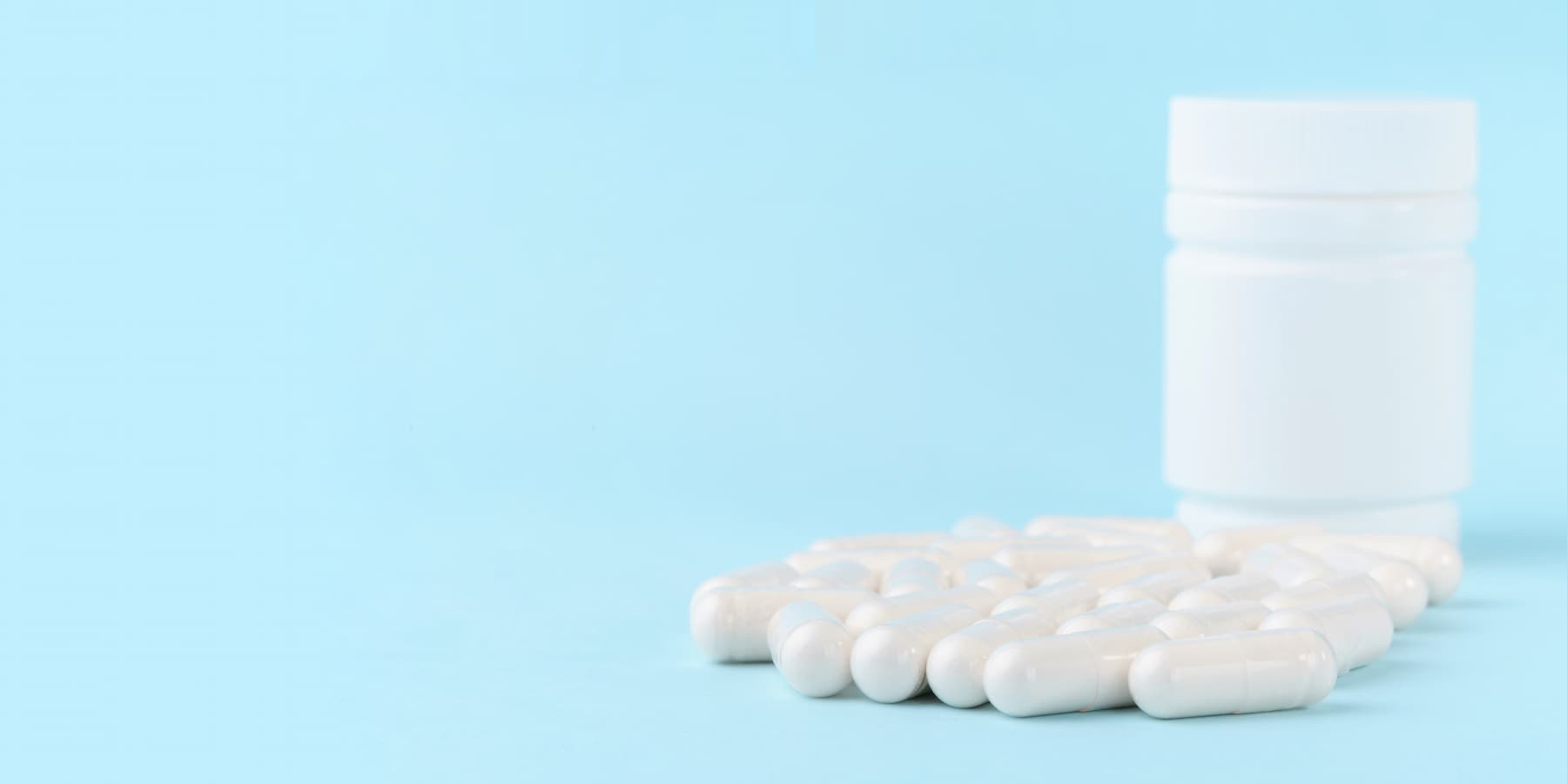
Chondroitin helps the joints and other elements of the body.
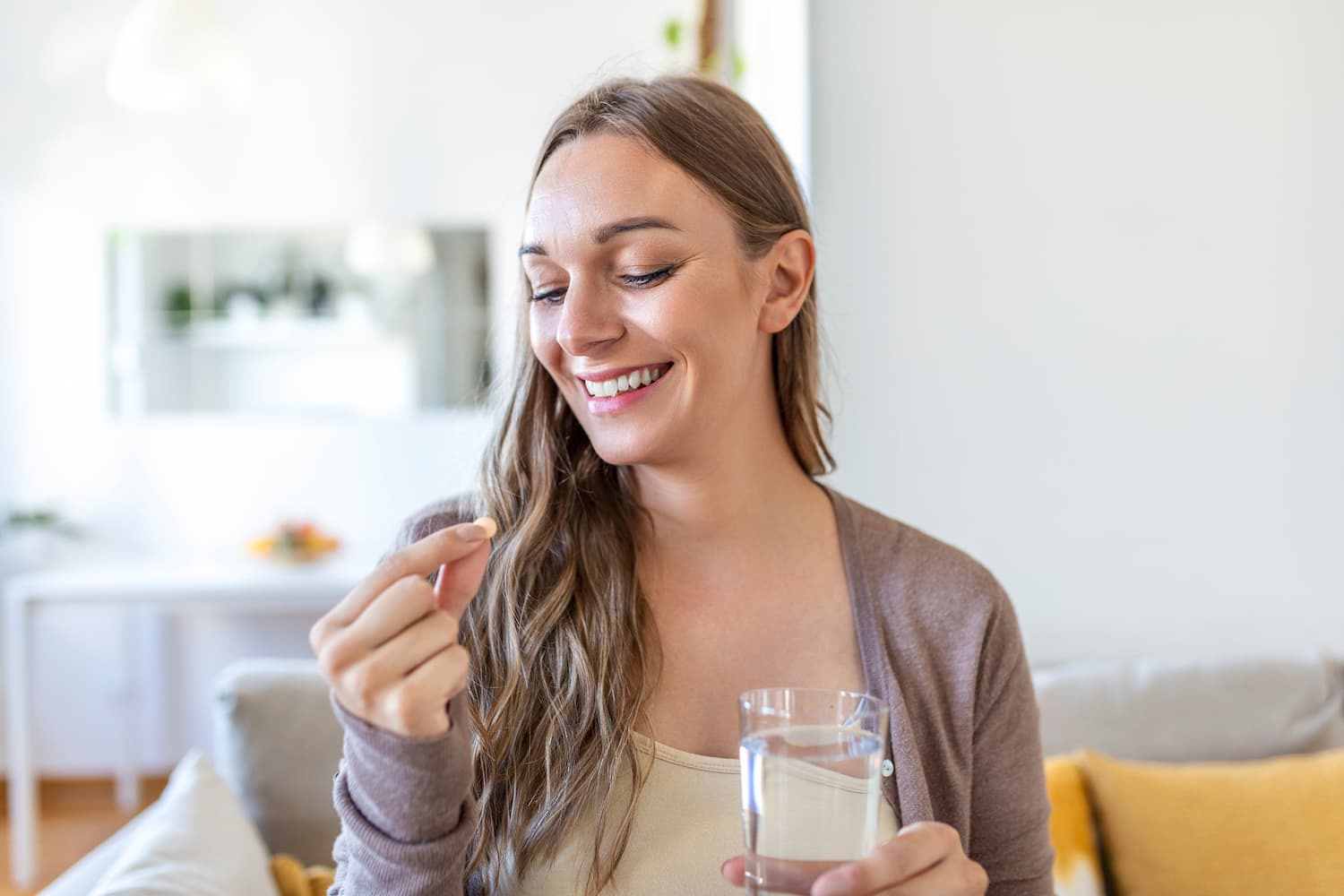
Glutathione is one of the most potent antioxidants for supporting the body's health. Find out how it works and where to get it from.
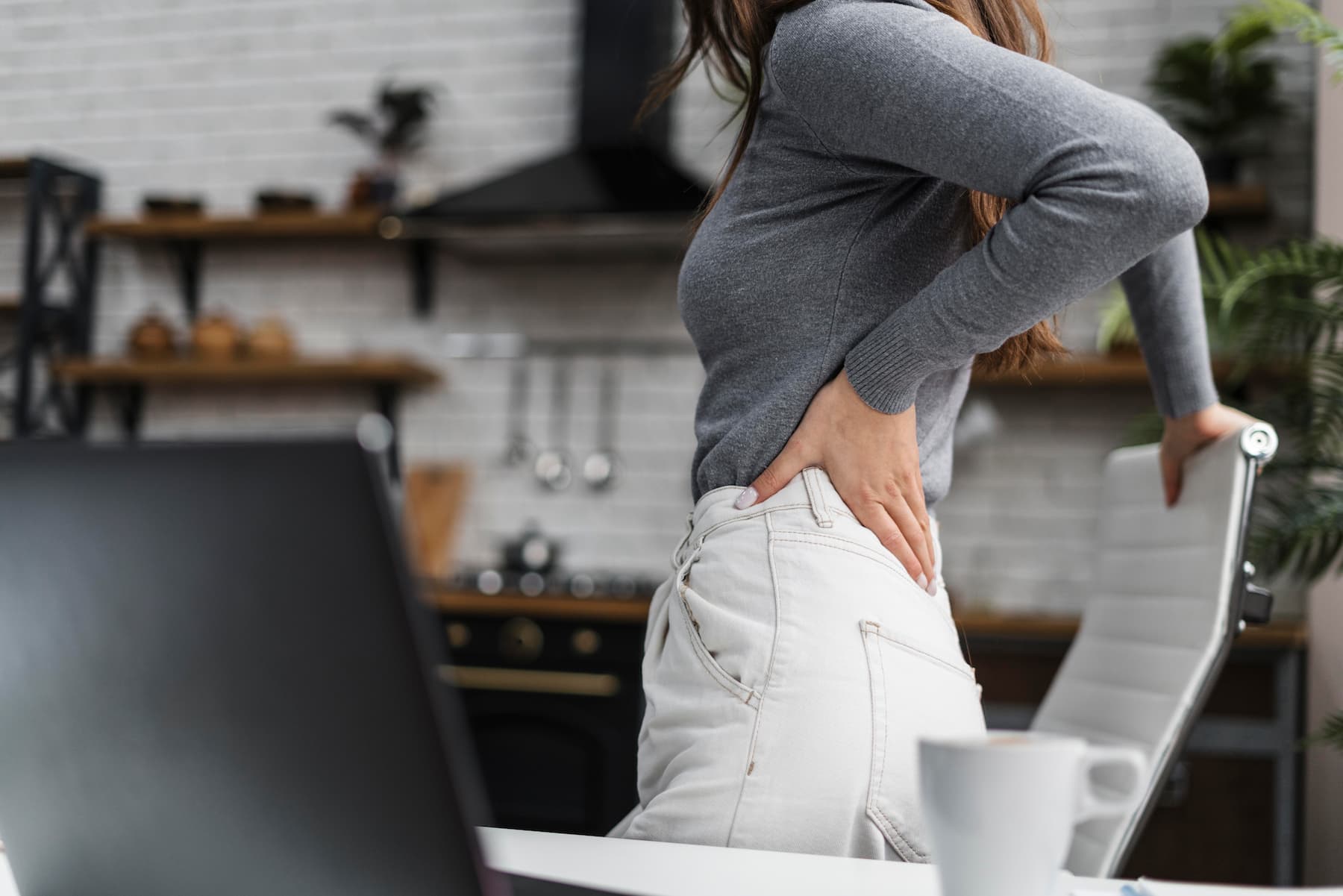
See why hip joints hurt and how to treat their ailments.
